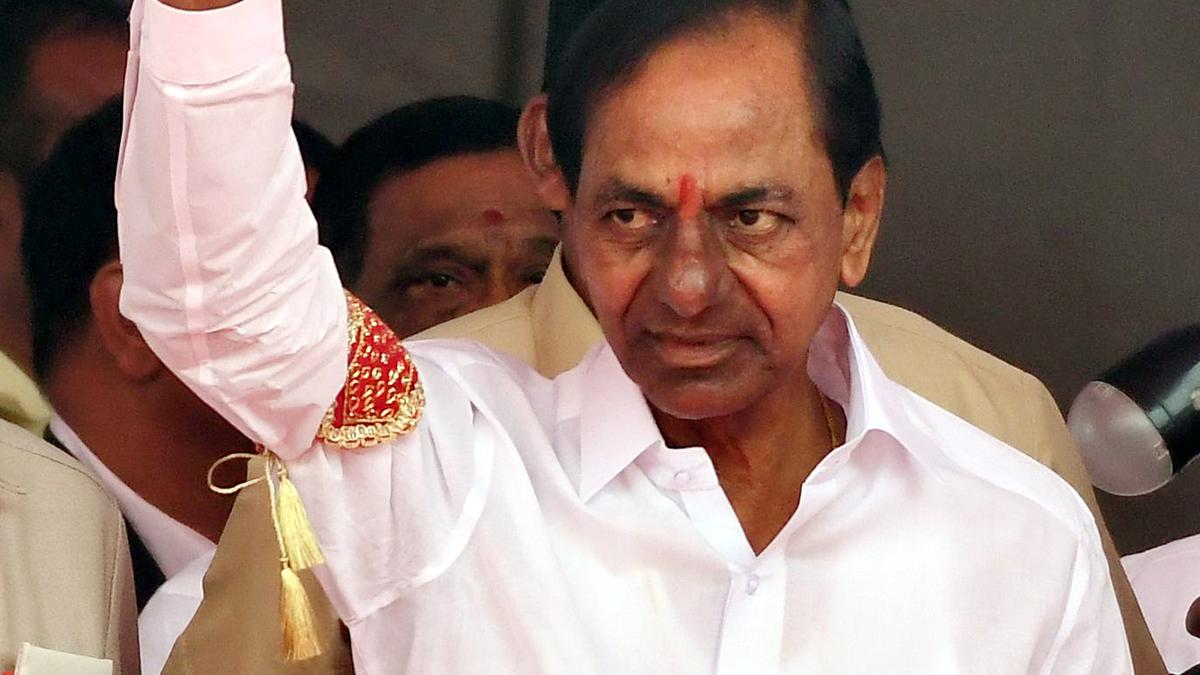
CM K. Chandrasekhar Rao firm on continuation of Dharani as it will ensure transparency in land transactions
The Hindu
The Chief Minister was addressing an impressive gathering after formally inaugurating the BRS party office.
Telangana Chief Minister K. Chandrasekhar Rao faulted the opposition Congress for its claims that Dharani portal will be scrapped if it is elected back to power claiming that such a move will bring back corruption in land deals and allow middlemen to thrive again.
He asserted that Dharani portal was introduced in the interest of people in general and farmers in particular. “How will you get Rythu Bandhu amounts into your accounts if Dharani portal is scrapped?” he asked.
He recalled how Dharani streamlined the land related issues preventing the entry of middlemen claiming that the portal had also helped in enabling timely payment of Rythu Bima to farmers families in case of death of the breadwinner. The Chief Minister was addressing an impressive gathering after formally inaugurating the BRS party office, Integrated District Offices Complex and the district police complex here on Friday.
He recalled how the district was known for prevalence of viral fevers in the past and how death of people due to these fevers occupied headlines in the newspapers. The BRS Government however ensured that safe drinking water was supplied to all households including those located in the remote parts and strengthened the medical infrastructure to avoid scope for such developments. “There are no deaths due to viral fevers since the past three years. This is possible because of the government’s decision to supply safe drinking water to all households, an initiative which put Telangana on the top across the country,” he asserted. He said the Government had also decided to upgrade tribal hamlets into panchayats and the decision had ensured equitable development of these villages in agency areas which hitherto were deprived of all the schemes.
The Chief Minister said from a stage where the State was in the grips of power crises, the proactive schemes launched by the government ensured that uninterrupted power supply was provided to all sectors for 24-hours. In this context, he assured that steps would soon be initiated to ensure three-phase power supply to farm lands owned by tribal families with an estimated ₹300 crore.
Mr. Rao positively responded to the requests made by the local MLAs and leaders for sanctioning of a bridge across Wardha river connecting neighbouring Maharashtra with a cost of ₹75 crore and an ITI in Asifabad to serve the needs of the people there. He announced ₹25 crore each for Asifabad and Kagaznagar municipalities and ₹10 lakh each to 335 gram panchayats in the area. Similar sanction was announced in respect of neighbouring Mancherial district.
“The BRS set its foot in Maharashtra where people are now demanding that the State Government implement Telangana model of development there too. People of the neighbouring State are seeking merger of their villages into Telangana so that accelerated development can take place,” he said.

“Writing, in general, is a very solitary process,” says Yauvanika Chopra, Associate Director at The New India Foundation (NIF), which, earlier this year, announced the 12th edition of its NIF Book Fellowships for research and scholarship about Indian history after Independence. While authors, in general, are built for it, it can still get very lonely, says Chopra, pointing out that the fellowship’s community support is as valuable as the monetary benefits it offers. “There is a solid community of NIF fellows, trustees, language experts, jury members, all of whom are incredibly competent,” she says. “They really help make authors feel supported from manuscript to publication, so you never feel like you’re struggling through isolation.”

Several principals of government and private schools in Delhi on Tuesday said the Directorate of Education (DoE) circular from a day earlier, directing schools to conduct classes in ‘hybrid’ mode, had caused confusion regarding day-to-day operations as they did not know how many students would return to school from Wednesday and how would teachers instruct in two modes — online and in person — at once. The DoE circular on Monday had also stated that the option to “exercise online mode of education, wherever available, shall vest with the students and their guardians”. Several schoolteachers also expressed confusion regarding the DoE order. A government schoolteacher said he was unsure of how to cope with the resumption of physical classes, given that the order directing government offices to ensure that 50% of the employees work from home is still in place. On Monday, the Commission for Air Quality Management in the National Capital Region and Adjoining Areas (CAQM) had, on the orders of the Supreme Court, directed schools in Delhi-NCR to shift classes to the hybrid mode, following which the DoE had issued the circular. The court had urged the Centre’s pollution watchdog to consider restarting physical classes due to many students missing out on the mid-day meals and lacking the necessary means to attend classes online. The CAQM had, on November 20, asked schools in Delhi-NCR to shift to the online mode of teaching.









